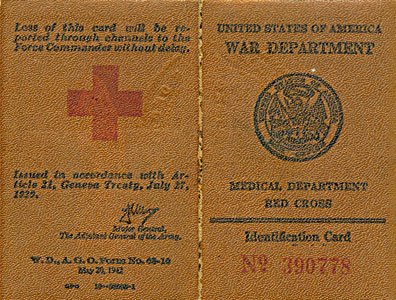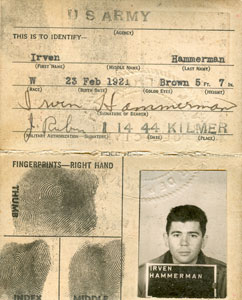|
Part Two
From the Everglades, I went
to England, still with the medical unit attached to Headquarters of the 4th
Infantry Division. I was instructed to give my family and friends the
following as my permanent army mailing address:
Headquarters Medical
Unit, Company C
42nd Field Artillery Battalion, 4th Division
I was told that all mail
would either be saved or forwarded to me, if possible. I was also told by
the battalion commanding officer that I might be going through special
training in the near future but, for the time being, I was to remain and
train with the 42nd. He told me he had no knowledge of what might be
involved in this training, and instructed me to say nothing about it.
 |
 |
|
My Identification
Card |
The entire division, about
eighteen thousand men, went overseas on a luxury liner that had been
converted into a troop ship. While aboard ship, we ate, exercised and slept
in shifts. We slept in hammocks stacked five high, with no more than
eighteen inches between hammocks. The space between the rows was so narrow
that it was almost impossible for us to pass each other. Under the bottom
hammock, which was about thirty inches above the deck (twenty inches when
someone was in the lower bunk), were piled our five duffel bags, one for
each soldier, containing all of our clothing, toiletries and other worldly
possessions.
The trip across was very
rough and many of the men got seasick, while others looked like they really
enjoyed the sea and probably should have been in the navy. The convoy, which
extended as far as the eye could see, consisted of troop ships, supply ships
and protective naval vessels. When we were within a hundred miles of the
English coast, our convoy was attacked by German subs. We lost several ships
and I don’t know how many men.
After fourteen days, we
docked in London. At night, in a pouring rain, we boarded a train—each man
carrying his duffel bag over his shoulder—and after six or seven hours we
reached Honiton, a town located in the county of Devon in the southwestern
part of England, just fourteen miles east of Exeter. We left the train and
were loaded onto army “six by six” trucks and, after a rather short ride, we
reached our destination—a farm about a half-mile outside of the town.
There were rows of Quonset
huts, which had been recently erected, and each hut contained a row of six
showers, six toilets, a potbelly stove and enough bunks for thirty
soldiers—the number of men in a platoon, or two squads. This was to be the
42nd’s home while in England, and for as long as we were there, the rain
never let up.
What I remember most about
Honiton were the people, who were warm, friendly and very appreciative of
our being there, and my introduction to fish-and-chips. Soldiers in training
are always hungry, and so after evening chow, and sometimes after several
hours of additional training, two men would either go over the fence
enclosing the camp, or would proceed through the main gates where guards
were posted in order to bring back as much fish-and-chips as they could
carry. The payoff to the guards for letting the two men go back and forth
through the main gates without reporting them was a portion of the
fish-and-chips. I am certain the officers knew what was going on.
While training in Honiton,
our commanding officer decided we would undergo a surprise gas attack just
to see how we would react. Everyone put on his gas mask except for one
soldier, whose name was Harvey Wolpen. At first he held his breath while
trying to locate his mask. Finally, no longer able to hold his breath and
thinking he was dying, he found his mask, although he had removed the
canister that made the thing work some time ago to make a convenient
carrying case for his candy. He emptied out all the candy, put the empty
facemask over his head and proceeded to take deep breaths. Everyone was
laughing and told him that, if it had been a real gas attack, he would have
been dead minutes ago. Not too many months later, and only two weeks after D
Day, a sniper shot and killed Harvey while he was crossing a field
surrounded by hedgerows in Normandy.
It was in Honiton, while
shopping during some of my free time, that I purchased two small, framed
etchings. I knew nothing about art, but the elderly gentleman in the shop
who sold them to me assured me they were something my parents back home
would appreciate and that they would only increase in value. When I got
married my parents gave them back to me, and even though we have moved more
than a few times, we have always had them hanging in our home.
It was also in Honiton that
we underwent our first air raid. It started one night around 11PM. We were
all very frightened and, as previously instructed, dashed outside in
whatever we happened to be wearing at the time. Most of us were already in
bed, and since most of us slept in our underwear, we covered ourselves with
our rain capes and plopped ourselves down in the protective trenches which
others had already dug around the perimeter of each of the Quonset huts. Of
course the trenches were all muddy from the seemingly never-ending rain. The
permanent personnel at the camp had a good laugh, since the bombs fell at
least a mile away, and we all had to shower before returning to our bunks.
After that, when there was an air raid, the bombs had to fall very close
before we would even think about entering the trenches.
While in Honiton, I stopped
at one of the churches in town and asked the minister if he knew of a Jewish
family with whom I could spend the Passover holiday. He told me of a family
by the name of Samuels, who lived in Exeter, “just a short train ride away.”
He said he would call the Samuels to make all the arrangements, and that I
should check back with him in a few days. This I did and he indicated that
the Samuels would be delighted to have me as their guest for dinner on the
first night of Passover.
I wanted to bring the family
something, and in those days cigarettes were almost impossible for civilians
to obtain. Most people were not aware then, as we are now, of the health
problems that smoking could cause. Since I had never smoked and had been
accumulating my monthly cigarette rations, I brought them several cartons of
cigarettes, for which they were very thankful. I remember Mrs. Samuels
opening a pack of cigarettes into a tray and then asking that we all be
seated for dinner.
While they really didn’t
have a Seder, as they were very Reform, I still enjoyed and will never
forget that dinner. It consisted of English rare roast beef with various
side dishes, like small potatoes that tasted like they had been cooked in
the gravy of the roast beef, and fresh green peas that they had picked from
their vegetable garden. They didn’t have matzos, but they also did not serve
bread in observance of the Passover holiday. This was my first home-cooked
meal in about six months and it was really a great treat for me.
When the meal was over they
served after-dinner drinks, and Mrs. Samuels offered me a cigarette. I told
her that I didn’t smoke, and she turned to offer one to her daughter,
Pamela, telling her she should take one because, “they are good for your
nerves and will calm you down.” I found out that Mr. Samuels owned a picture
frame factory, and he told me how fortunate they were that it was never the
target of any of the German bombings.
I was invited back to visit
the Samuels several times, and Pamela showed me around the city of Exeter.
We walked along a two-lane road until we got to the main part of town, and
we did some shopping in the business district. On another visit, we took a
train ride to a beach in Torquay which, in peacetime, was a famous resort
area on the English Channel. Years later, while on a trip to London with my
wife, I tried to find the Samuels, but had no luck.
 Part Three
Part Three
|